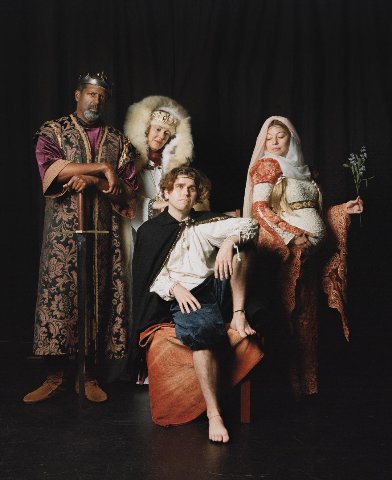The Anarchy Quartet by Stuart Bousel
The Exit Theatre
By: Victor Cordell - Aug 10, 2022
Stress is visited upon all human beings, of great bearing and small. The possible loss of face or possessions or relationships drives our concerns. The difference for nobles who vied for hereditary thrones in days of old is that their stress routinely concerned the possible loss of life. Monarchs as well as claimants and the presumed allies of both could fully trust no one. Intrigue was constant, and life could end early and violently. The many eras of contested claims to the monarchy were rife with threats to all those close to the sovereign.
Mid-Twelfth Century England was one such period of turmoil. The triggering event leading to the instability was the infamous White Ship Disaster of 1120, in which a large number of nobles perished when the boat, carrying 300 passengers, sank after hitting a reef in the English Channel. Included in that number was Adelin, the only legitimate son of King Henry I of England. Thus, when the king died in 1135, the battle for his throne, the so-called Anarchy, began. The victor was Henry’s nephew, Stephen de Blois, who would rule for 18 years after an invasion from France and a coup d’etat.
Playwright Stuart Bousel has taken this context to create a theatrical piece involving four of the principals of the period. The characters and the events represented are historically accurate, but the play consists of the possible thoughts of the four subjects. It is highly literate and will be of particular interest to those who are drawn to the history of the period. But those without prior knowledge may find it difficult to follow because of the complexity of the relationships and how quickly they are rolled out (but this commentary will help!).
Extremely well acted with great conviction and animation by all, the principals do not interact. Therefore, there is no real drama. Each person is, in a sense a raconteur, with their own story to tell, which they deliver in scattered vignettes to the audience from their own assigned portion of the stage. Curtis Overacre’s excellent lighting highlights each speaker in turn. Many snippets are individually interesting, and distinctive personalities emerge that are well defined by the playwright and well exploited by the actors. While there are concluding events in the true history, the play ends without closure or postscript, leaving a sense of incompleteness.
Although the notion of attributing insignificant events and concocted dialogue is part and parcel of historical fiction, the most fanciful aspect of “The Anarchy Quartet” is that the triggering figure, Adelin, is long dead and appears as a ghost. Suitably portrayed as somewhat blasé and clever by Max Seijas, Adelin’s cavalier philosophy leads him to conclude that history is kinder to him than if he’d survived and become king. As he died trying to save his half-sister, Matilda, he remains forever a hero, but if he’d been a mediocre king, he would have been long forgotten.
Adelin’s sister, Matilda (known as Maude, because her mother, half-sister, sister-in-law, and other noblewomen were also named Matilda) is played with imperiousness and sarcasm by Catherine Luedtke. The excitable Maude had already been Empress of the Holy Roman Empire until the emperor died. With the death of her beloved brother, she was anointed as heir by Henry I, but her forces were defeated by Stephen, whom she disdainfully refers to as “The Moustache.”
The action of the play occurs during Stephen’s reign. Stephen is played as diffident and humorous by Fred Pitts. One of the main causes of his self-effacing is the reason that he (literally) missed the boat and was not among the victims of the White Ship’s sinking. But you have to see the play to find out the reason.
Finally, whereas Eleanor of Aquitaine harbors ambitions, she is the most gentle of the four, played with finesse and subtle humor by Katherine Park. Eleanor’s leitmotif is patience, which she urges to her unborn as she rubs her pregnant belly. Like Maude, who envies common people because they can look for love, Eleanor also values love and wishes she had a more normal upbringing that would have allowed non-political connections.
The play does not continue beyond Stephen’s reign, but without a surviving son, he agreed that Maude’s son would succeed him to the throne. In 1154, that son would become Henry II, immortalized by Shakespeare and the movie “The Lion in Winter.” He would take as a wife [drum roll] - Eleanor of Aquitaine, making Maude her mother-in-law.
These nobles were all significant personages in their time. The narrative weaves back and forth among the principals and makes many connections among them. Along the way, the playwright offers insights into the personalities and conflicts of this foursome. Even though they held special places in their societies, perhaps the most significant representation is that they still faced many of the same issues as regular folk. Through these characters, the play interestingly delves into the realms of chance, aspiration, power, relationships, forbearance, and more.
Despite the small venue at The Exit, the production has fine touches. In addition to the notable lighting, Nick Trengove’s staging is simple, yet exquisite, blending aspects of nature and symbols of power and war. The striking costumes are absolutely fitting (pun intended). Trengove’s direction also deserves recognition, especially for the smoothness of all of the transitions of soliloquys from one speaker to the next.
“The Anarchy Quartet,” a world premiere written by Stuart Bousel, is presented by The Exit Theatre and appears on its stage at 156 Eddy Street, San Francisco, CA through August 20, 2022.
Courtesy of CordellReports.com

